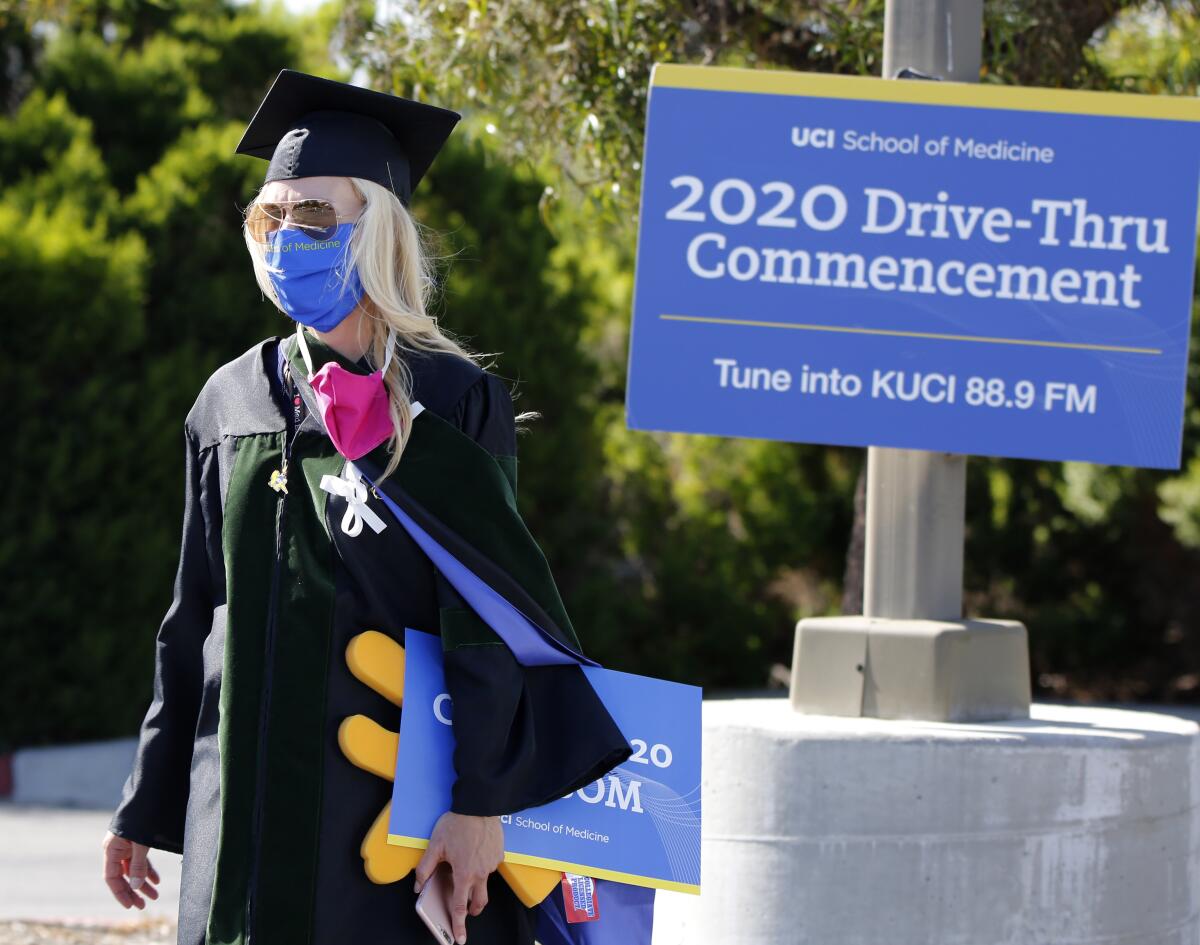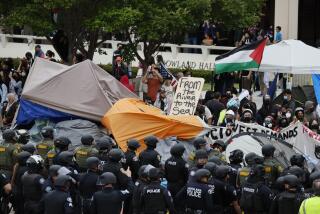Students struggle to make campus housing decisions as colleges make reopening plans

When the UC Irvine campus abruptly shut down in mid-March in response to the coronavirus — like many colleges across the country — Lori Sinanian immediately left her nearby apartment to shelter with her family in Los Angeles.
To break the lease on the Irvine Co-owned apartment, Sinanian and her three roommates ponied up nearly $2,000 apiece.
“It was a horrible situation,” said Sinanian, who is graduating this month. “We paid two months extra for an empty apartment.”
The situation isn’t unique to Sinanian. Dozens of students are now protesting Irvine Co.’s practices amid the pandemic and recently urged local officials to intervene. The company declined to comment through a spokesperson but pointed out that the company has offered temporary rent reductions.
Without city action, the students aren’t legally protected. Lease-breaking isn’t one of the statewide emergency rent protections enacted because of the pandemic.
Only Solano County has passed a law giving residents the right to temporarily break lease agreements without penalty, as long as it’s related to the coronavirus, according to Joseph Tobener, a Bay Area attorney specializing in tenant law.
There are other emergency protections in place. Gov. Gavin Newsom halted residential evictions in California for three months following the end of the coronavirus emergency period. In the city of Los Angeles, residents can defer rental payments for up to a year after the local state of emergency ends.
American Campus Communities, a large national student housing owner, has maintained mostly steady occupancy since March, Chief Marketing Officer Jason Wills said. Wills called a rash of lease-breaking in the spring a “knee-jerk response” to confusion and concern. In mid-April, the company preleased 76.6% of its portfolio for the upcoming academic year — up from 76.2% during the same period last year.
However, Tobener said his law office is fielding 15 to 20 calls a week from parents and students, primarily in the Bay Area, who want to break their lease. “It’s only going to get worse,” he said.
Tom Bannon, president of the California Apartment Assn., said several concerned landlords reached out for advice about the issue last month.
Tobener and Bannon figure that more students might want to get out of their leases if their campuses remain closed or open for limited use, singling out the University of California system, which hasn’t yet announced concrete plans for the fall.
“The big question is, are those students going to stay with Mom and Dad or friends, or are they going to move into those apartments that they had planned to move into?” Bannon said.
UC officials said all of its campuses will be “in operation,” in the fall, but they have offered little detail. Each campus is likely to announce a plan this month, spokeswoman Sarah McBride said.
“We are considering a mixed approach for classes” — sometimes referred to as a hybrid model — “with some student instruction potentially delivered in classrooms and labs, while other instruction may remain remote,” McBride said in a statement.
USC announced it would offer in-person classes with safety measures and online classes in the fall, becoming one of the first major universities in the state to announce a specific reopening plan. California State University, the largest four-year college system in the country, plans to offer instruction primarily online, with some exceptions.
Referring to the hybrid model, Sinanian said, “Students are now wondering, ‘Am I going to rent an apartment for one in-person class?’”
Drew Sugars, a spokesman for Glendale Community College, said the lines between what universities mean when they say they will be open or closed is blurring. His community college will stick to distance learning in the fall, with some exceptions.
Other schools are “basically saying what I’m saying, but they’re packaging it differently,” Sugars said.
That means students are making fall housing decisions based on limited details of what “open” and “closed” will really look like.
Jimmy Winick, a rising junior at UCLA, signed a lease for a nearby apartment even before the pandemic hit. He said landlords weren’t letting other students he knew out of their leases after the coronavirus hit, “so I wouldn’t imagine that they’d let us out if something like online classes happened.”
Winick isn’t going to try to break his lease. Echoing several students, Winick said he wants to be close to campus, “to pick back up at least a little bit on some of the social element that we’ve all kind of been missing.”
More to Read
Sign up for Essential California
The most important California stories and recommendations in your inbox every morning.
You may occasionally receive promotional content from the Los Angeles Times.











